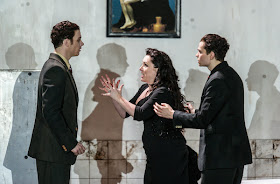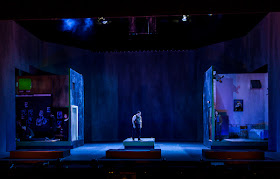 | |
| Christopher Ainslie, Iestyn Davies Act 2 of Rodelinda, photo Clive Barda |
Reviewed by Robert Hugill on Feb 28 2014
Star rating:
Richard Jones' gothick schlock horror version of Handel's opera redeemed by superb performances.
Handel's Rodelinda is one of his greatest operas and the directness of its plot has meant that it has attracted directors. Now Richard Jones has given us a new production inspired by Italian film noir, in the first production of the opera at the London Coliseum. English National Opera fielded a superb cast with Rebecca Evans in the title role, Iestyn Davies as her husband Bertarido, John Mark Ainsley as Grimoaldo, Susan Bickley as Eduige, Richard Burkhard as Garibaldo and Christopher Ainslie as Unulfo, conducted by Christian Curnyn.
The plot can be told relatively succinctly, Bertarido has been deprived of his throne by Grimoaldo, who is supported by Garibaldo. In order to be able to flee with his wife and son, Bertarido has faked his own death. But when he returns, secretly supported by Unulfo, he has worries over his wife's faithfulness. Grimoaldo is in love with Rodelinda and wants her to marry him, she agrees but then insists he kill her son first. Eduige, Bertarido's sister is in love with Grimoaldo and has connived in Bertarido's downfall. With Grimoaldo's treachery to her, she havers. All ends happily in the end.
Richard Jones, set designer Jeremy Herbert and costume designer Nicky Gillibrand set the opera in Italy in the mid-1950's. The set for the opening scenes of act one consisted of a pair of rooms, side by side. Stage left we saw the room where Grimoaldo (John Mark Ainsley) ran things, monitoring his prisoners on primitive camera. Stage right was the room where Rodelinda (Rebecca Evans) had been incarcerated, along with her son Flavio (Matt Casey). For the opening and closing scenes of acts one and two, we stayed in this set which enabled Jones to keep virtually his entire cast on stage at all times. During Rodelinda's solos, we had Ainsley's Grimoaldo, Richard Burkhard's Garibaldo, Christopher Ainslie's Unolfo and sometimes Susan Bickley's Eduige at the other side of the stage. The result was to give the opera a hyper-active style; arias were never calm and the singer was often not the focus of the action. This is not of style of performance that I like in opera seria, but talking to people at the first interval I realise that I am in a minority. But things were redeemed by the superb performances that Jones got from his singers.
One major change was that Rodelinda's young son was played by an adult actor, Matt Casey, giving Flavio a character more akin to Sesto in Giulo Cesare, always hell bent on revenge and present during most of his mother's arias.
For the middle scene in act one, the rooms disappeared and we had the base of a gargantuan monument to the presumed dead Bertarido. A spectacular visual coup, but one which required the scenes before and after to take place in front of the drop curtain. Something that was repeated in each act. The middle of act two took place in a bar (the location for Bertarido's glorious pastoral aria, in Jones's view the maunderings of a drunk). Then in act three the ruins of the now demolished monument. This entailed rather a lot of the opera played in front of the drop curtain, which in terms of modern staging techniques seems to be something of a failure.
 |
| John Mark Ainsley, Iestyn Davies, Richard Burkhard Act Three, photo Clive Barda |
In addition to treating the violence in comic manner, Jones clearly felt that the overall balance of the opera needed adjusting and he repeatedly pulled focus during the great moments. Many of Rebecca Evans arias were sung to the accompaniment of vivid mime from Matt Casey as her son, which produced a comic undertow. For the glorious duet at the end of act two, then Bertarido and Rodelinda are united only to be parted again, Jones had the first two thirds of the duet underpinned by near comic violence from Ainsley, Burkhard and Ainslie, then for the da capo the scenery started to move and two parts of the set disappeared into the wings. But not content with upstaging the principals, Jones left John Mark Ainsley alone in the centre of the empty stage as the focus of our attention. Then in act three with Bertarido's triumphant aria, Jones underpinned Iestyn Davies' glorious singing with yet more comic violence. I haven't mentioned the obsession with tattoos, but that's enough moaning.
Quite simply I don't want Rodelinda re-invented as a comedy or as schlock horror. It works perfectly well as it is. The miracle was that Jones and conductor Christian Curnyn elicted such superb performances from the singers.
 |
| Christopher Ainslie, Rebecca Evans, Matt Casey photo Clive Barda. |
She was finely partnered by the Bertarido of Iestyn Davies. The role of Bertarido was written to showcase the castrato Senesino's ability depicting the pathetic. Davies voice, with its beauty of tone, sense of line and firmness of core, has a beautiful edge to it which meant that the arias never turned saggy as they can do. Davies was never annoying, we never felt he ought to snap out of it. Instead we sensed the focussed core of the man. It helped that the arias were so finely sung. His aria in act one, in front of his own funeral monument, was spine-tingling and he even managed to make the act two pastoral aria seem finely beautiful despite the bar room setting. In the act two duet Davies balanced Evans well and the two were more than a match for moving scenery; it is the voices that I remember, intertwining has only Handel can. Even the act in three aria of triumph, despite the hi-jinks on stage Davies gave us stunning trumpet tones and some very fine passage work.
 |
| Rebecca Evans, John Mark Ainsley, Iestyn Davies Act two finale, Photo Clive Barda |
Richard Burkhard had the possibility of being quite a threatening Garibaldo. In Handel's opera Grimoaldo is weak and it is Garibaldo who is the real engine of the violence. Burkhard clearly had this in mind, though as the violence got more comic his position was undermined. That said, we had some fine singing and nicely focussed drama.
For some reason directors tend to see Eduige as a rather desperate figure, and female sexual desperation is all too easily turned comic by directors. This is what happened here. Whilst Susan Bickley never played Eduige for laughs, the general tone became somewhat comic (more sit-com than edge of the seat drama). But everything that Bickley does is interesting and watchable, and here she combined it with some admirably focussed singing. Bickley is still a very fine Handel singer and certainly held her own against the rest of the cast.
Christopher Ainslie's problem was simply that none of Unolfo's arias are dramatically essential. So whilst Ainslie turned in some excellently expressive singing, the staging displayed Richard Jones at his inventive best/worst.
In the pit Christian Curnyn presided with his customary skill and flair, encouraging the ENO orchestra to provide some very fine accompaniment.
Anything that Richard Jones does is highly watchable. The libretto to Handel's Rodelinda, written by Nicola Francesco Haym based on that of Antonio Salvi, is one of the best that Handel set. It isn't perfect, but the lines of the drama are clear. Richard Jones had clearly listened to the music, but seems to have found a different drama or perhaps he just didn't have confidence in Handel and Haym's opera. Whatever the reason, the result is of uncertain tone with an awkward mixture of the comic and the serious, redeemed by some remarkably fine performances.
Elsewhere on this blog:
- Fallen Women at WNO: Verdi's La Traviata
- Fallen Women at WNO: Puccini's Manon Lescaut
- Dramatic intensity: Lieder by Brahms and Wolf from Alastair Miles
- Happening at the Barbican: Circa and Quatuor Debussy in Opus
- Delight and charm: Paul Bunyan at ETO
- Total Immersion: Thea Musgrave at the Barbican
- Cantus Cölln at the Wigmore Hall
- Powerful performance: Rigoletto at ENO
- See it if you can: ETO in Tippett's King Priam
- Mei Yi Foo: Lunchtime recital at Wigmore Hall
- Chansonnerie from Londinium
- Dance away: Ciaccona from Guillermo Brachetta - CD review
- Luminous: Vox Luminis at Cadogan Hall
- Home

No comments:
Post a Comment